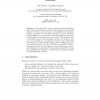Free Online Productivity Tools
i2Speak
i2Symbol
i2OCR
iTex2Img
iWeb2Print
iWeb2Shot
i2Type
iPdf2Split
iPdf2Merge
i2Bopomofo
i2Arabic
i2Style
i2Image
i2PDF
iLatex2Rtf
Sci2ools
113
click to vote
ICALP
2000
Springer
2000
Springer
A Statically Allocated Parallel Functional Language
Abstract. We describe SAFL, a call-by-value first-order functional language which is syntactically restricted so that storage may be statically allocated to fixed locations. Evaluation of independent sub-expressions happens in parallel--we use locking techniques to protect shared-use function definitions (i.e. to prevent unrestricted parallel accesses to their storage locations for argument and return values). SAFL programs have a well defined notion of total (program and data) size which we refer to as `area'; similarly we can talk about execution `time'. Fold/unfold transformations on SAFL provide mappings between different points on the area-time spectrum. The space of functions expressible in SAFL is incomparable with the space of primitive recursive functions, in particular interpreters are expressible. The motivation behind SAFL is hardware description and synthesis--we have built an optimising compiler for translating SAFL to silicon.
First-order Functional Language | ICALP 2000 | Programming Languages | Shared-use Function Definitions | Unrestricted Parallel Accesses |
Related Content
| Added | 24 Aug 2010 |
| Updated | 24 Aug 2010 |
| Type | Conference |
| Year | 2000 |
| Where | ICALP |
| Authors | Alan Mycroft, Richard Sharp |
Comments (0)

